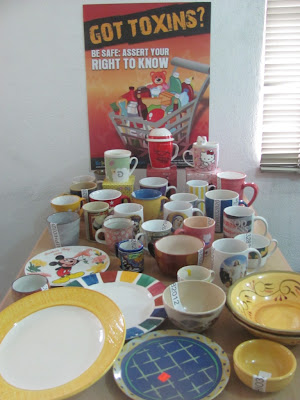Watchdog Finds Toxic Goods in "Ukay-Ukay" and Surplus Stores




Quezon City. Beware: cheap items sold in shops selling old and new personal and household stuff from Japan, South Korea and US are not necessarily “good deal” as some may contain chemicals that are harmful to health and the environment.
The EcoWaste Coalition, a toxics watchdog, issued this reminder as budget-conscious Filipinos flock to “ukay-ukay” (second-hand) and surplus stores to find imported products at low, if not give-away, prices.
The reminder was prompted by the chemicals screening conducted by the group last Friday, March 30, using an X-Ray Fluorescence (XRF) spectrometer for 35 samples of mugs, plates and bowls bought from 10 “ukay-ukay” and surplus retailers in the cities of Caloocan, Manila and Quezon.
The items were produced in China, Italy, Japan, Mexico, South Korea, Taiwan and the USA and sold from P20 to P90.
35 of the 35 samples had toxic metals above levels of concern, including 23 samples with lead, a potent neurotoxin, up to over 100,000 parts per million (ppm), and 19 samples with cadmium, a probable cancer-causing agent, up to 3,791 ppm, exceeding the US regulatory limit of 90 ppm for lead and 75 ppm for cadmium in consumer products.
“Our investigation shows that certain dinnerware contains alarming amounts of lead and cadmium that can potentially leach and cause long-term health risks. None of these products indicate that they are made lead or cadmium glazes or paints,” Aileen Lucero of the EcoWaste Coalition's Project PROTECT said.
“We also detected other chemicals of concern in the samples, including antimony, arsenic, chromium and, in some cases, traces of mercury,” she added.
"Products used for eating and drinking simply should not contain any lead or other toxic metals as there really is no safe level of exposure for these substances, especially for a young child," she asserted.
Two samples (a plate and a cup) stood out for having lead that exceeds 100,000 ppm, which is beyond the XRF calibration unit.
Among the mugs, a small blue cup with a floral design supposedly made in Mexico registered with the highest amount of lead at more than 100,000 ppm. This item was bought from an “ukay-ukay” shop in Santa Cruz, Manila that sells used items from Japan and USA.
Among the dinnerware, a white and yellow “Stangl” plate from New Jersey had the highest level of lead at over 100,000 ppm. This item was purchased from an "ukay-ukay" shop in Cubao, Quezon City that sells second-hand products from USA.
The other top five “ukay-ukay” items with elevated levels of lead include a beige and gold bowl with 47,700 ppm, a “Halloween” mug with 36,300 ppm, a yellow bowl with floral design with 32,900 ppm, a hand-painted plate with 30,100 ppm, and a coffee mug decorated with a cartoon strip with 20,700 ppm.
Interestingly, three “made in China” mugs with the revered images of a resurrected Jesus Christ, “Our Lady of Sorrows” and “Our Mother of Perpetual Help” were found to contain high levels of cadmium, a potential human carcinogen, ranging from 136 to 2,051 ppm . These items were obtained from the “American Bazaar” section of Daiso Japan Store in Cubao.
The samples were procured between March 27 to 29 from Asia Consumer Value Trading and Home Saver in Monumento, Caloocan City; Japan Home Centre and Saizen in Robinsons Place, Ermita and the Avenue Japan Surplus Shop, Hapon Surplus Trading and Hirofuku Trading in Santa Cruz, Manila; and the Daiso Japan Store and CSMA Surplus Trading in Cubao, and Nice Mart in Barangay Central, Quezon City.
“Going to your favorite ‘ukay-ukay’ or surplus stores may be bad for your health and that of your family if you do not know what exactly you are buying and paying for,” Lucero said.
“We’re not saying you should stop going to these places to shop for your needs, but you should always be nosy and insist on product safety information before heading to the cashier to pay for your purchase. In fact, a safety-conscious consumer should demand information regardless of where the product is bought,” she emphasized.
"Retailers who care for the health and safety of their customers should immediately take the tainted items off their stores," she added.
Exposure to lead can result in reproductive, developmental, behavioral and neurological disorders, including birth defects, attention deficit disorder, decreased intelligence, language and speech problems, and a host of other ailments such as poor muscle coordination, high blood pressure, and damage to the brain and the kidneys.
Ceramic and glass coffee mugs, drinking cups, plates and bowls are often adorned with painted or oven-fired colors containing lead and other heavy metals such as cadmium, the EcoWaste Coalition observed.
These toxic metals can migrate out of these containers resulting to chronic poisoning due to repeated contact between the tainted vessel and the beverage or food a person consumes, it said.
Lead or cadmium-based glasses and ceramics can reach and contaminate the waste stream, leaching their toxic components onto the ground and surface water and the environment, the group also pointed out.
-end-





Comments